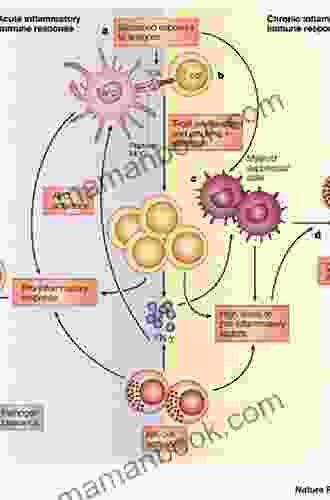Autism: Oxidative Stress, Inflammation, and Immune Abnormalities

5 out of 5
| Language | : | English |
| File size | : | 11507 KB |
| Screen Reader | : | Supported |
| Print length | : | 456 pages |
Autism spectrum disorder (ASD) is a neurodevelopmental condition characterized by impaired social interaction and communication, as well as repetitive and restrictive behaviors. Despite extensive research, the exact cause of ASD remains elusive, but growing evidence suggests a complex interplay between genetic and environmental factors, including oxidative stress, inflammation, and immune abnormalities.
Oxidative Stress and Redox Balance
Oxidative stress refers to an imbalance between the production of reactive oxygen species (ROS) and the body's antioxidant defense systems. ROS are naturally produced by cellular metabolism, but excessive ROS levels can cause cellular damage and dysfunction. In autism, studies have shown increased oxidative stress markers in brain tissue, peripheral blood, and cerebrospinal fluid, suggesting a potential role in the disorder's pathogenesis.
The antioxidant defense system consists of enzymes and molecules that neutralize ROS and prevent oxidative damage. In individuals with autism, impairments in antioxidant defense pathways have been reported, further contributing to oxidative stress.
Inflammation and Neuroinflammation
Inflammation is a complex biological response to infection or tissue injury. In autism, chronic low-grade inflammation, particularly in the central nervous system (CNS),has been implicated. This neuroinflammation is characterized by the activation of microglia, the immune cells of the CNS, and the release of pro-inflammatory cytokines.
Neuroinflammation has been linked to neuronal damage, synaptic dysfunction, and behavioral abnormalities in animal models of autism. In humans, studies have found elevated levels of inflammatory markers in the cerebrospinal fluid and peripheral blood of individuals with ASD.
Immune Abnormalities
The immune system plays a crucial role in defending the body against pathogens. However, dysregulation of the immune system has also been associated with neurodevelopmental disorders, including autism.
Individuals with ASD have been shown to have altered immune responses, including abnormal cytokine production, dysregulation of T and B lymphocytes, and impaired antibody responses. These immune abnormalities may contribute to the neuroinflammation and oxidative stress observed in autism.
Additionally, the gut-brain axis, which connects the gastrointestinal tract to the CNS, has been implicated in ASD. Dysbiosis, an imbalance of gut microbiota, has been linked to inflammation and immune abnormalities in autism, further contributing to the complex interplay of factors involved in the disorder.
Therapeutic Implications
The growing understanding of the role of oxidative stress, inflammation, and immune abnormalities in autism provides potential therapeutic targets. Interventions aimed at reducing oxidative stress and neuroinflammation, as well as modulating immune responses, may hold promise for improving symptoms and outcomes in individuals with ASD.
Some promising therapeutic strategies include:
- Antioxidants and redox-modulating agents
- Anti-inflammatory medications
- Immunomodulatory therapies
- Probiotics and prebiotics to modulate gut microbiota
The relationship between autism, oxidative stress, inflammation, and immune abnormalities is a complex and emerging area of research. While the exact causal mechanisms are yet to be fully elucidated, the growing body of evidence points to a critical role for these factors in the development and pathogenesis of ASD.
Further research is needed to validate these findings, identify specific molecular pathways, and develop targeted therapeutic interventions. By understanding the intricate interplay of these factors, we can improve our understanding of ASD and provide hope for more effective treatments in the future.
References:
- Hussman, J. P. (2019). Mitochondria and oxidative stress in the pathogenesis of autism spectrum disorder: A systematic review. International Journal of Molecular Sciences, 20(21),5592.
- Wang, X., & Ashwood, P. (2017). Immune Dysfunction in Autism Spectrum Disorder: A Review. Frontiers in Immunology, 8, 1779.
- Parekh, T., & Chattopadhyay, S. (2018). Neuroinflammation in Autism Spectrum Disorders: A Review. Frontiers in Cellular Neuroscience, 12, 332.
- Liu, X., & Yang, Z. (2021). The Gut Microbiome in Autism Spectrum Disorders: A Systematic Review. Journal of Autism and Developmental Disorders, 51(7),2314-2330.
5 out of 5
| Language | : | English |
| File size | : | 11507 KB |
| Screen Reader | : | Supported |
| Print length | : | 456 pages |
Do you want to contribute by writing guest posts on this blog?
Please contact us and send us a resume of previous articles that you have written.
 Top Book
Top Book Novel
Novel Fiction
Fiction Nonfiction
Nonfiction Literature
Literature Paperback
Paperback Hardcover
Hardcover E-book
E-book Audiobook
Audiobook Bestseller
Bestseller Classic
Classic Mystery
Mystery Thriller
Thriller Romance
Romance Fantasy
Fantasy Science Fiction
Science Fiction Biography
Biography Memoir
Memoir Autobiography
Autobiography Poetry
Poetry Drama
Drama Historical Fiction
Historical Fiction Self-help
Self-help Young Adult
Young Adult Childrens Books
Childrens Books Graphic Novel
Graphic Novel Anthology
Anthology Series
Series Encyclopedia
Encyclopedia Reference
Reference Guidebook
Guidebook Textbook
Textbook Workbook
Workbook Journal
Journal Diary
Diary Manuscript
Manuscript Folio
Folio Pulp Fiction
Pulp Fiction Short Stories
Short Stories Fairy Tales
Fairy Tales Fables
Fables Mythology
Mythology Philosophy
Philosophy Religion
Religion Spirituality
Spirituality Essays
Essays Critique
Critique Commentary
Commentary Glossary
Glossary Bibliography
Bibliography Index
Index Table of Contents
Table of Contents Preface
Preface Introduction
Introduction Foreword
Foreword Afterword
Afterword Appendices
Appendices Annotations
Annotations Footnotes
Footnotes Epilogue
Epilogue Prologue
Prologue Kamran Afary
Kamran Afary Randy Larson
Randy Larson Carl Sandburg
Carl Sandburg Paul Kretschmar
Paul Kretschmar Bruce Zortman
Bruce Zortman The Brothers Rodemeyer
The Brothers Rodemeyer Jon Staff
Jon Staff Pleasant Surprise
Pleasant Surprise Vincent Bevins
Vincent Bevins Mike Davis
Mike Davis Luchrisa Valentine
Luchrisa Valentine Justo May Correa
Justo May Correa Douglas Gill
Douglas Gill D Lulu
D Lulu Jennifer Lees Marshment
Jennifer Lees Marshment Kurt Vonnegut
Kurt Vonnegut David S Wyman
David S Wyman Sri Vishwanath
Sri Vishwanath Laura Lee Guhrke
Laura Lee Guhrke Uchenna Njiaju
Uchenna Njiaju
Light bulbAdvertise smarter! Our strategic ad space ensures maximum exposure. Reserve your spot today!

 Levi PowellUnveiling the Entrancing Allure of Seven Weeks My Possessive Bodyguard Bonus...
Levi PowellUnveiling the Entrancing Allure of Seven Weeks My Possessive Bodyguard Bonus... Dwight BlairFollow ·7.1k
Dwight BlairFollow ·7.1k Charlie ScottFollow ·4.2k
Charlie ScottFollow ·4.2k Alan TurnerFollow ·6.4k
Alan TurnerFollow ·6.4k Darius CoxFollow ·13.9k
Darius CoxFollow ·13.9k Franklin BellFollow ·7k
Franklin BellFollow ·7k Cody RussellFollow ·8k
Cody RussellFollow ·8k Grant HayesFollow ·3.6k
Grant HayesFollow ·3.6k James GrayFollow ·8k
James GrayFollow ·8k

 Ernest Powell
Ernest PowellBenefits of Corporal Punishment: A Review of the...
Corporal punishment is a form of physical...

 Bobby Howard
Bobby HowardThe Development and Significance of African American...
African American...

 Guy Powell
Guy PowellDown Girl: The Logic of Misogyny - A Comprehensive...
In her groundbreaking work,...

 Forrest Blair
Forrest BlairThe Bikini Changing Room: A Micro Mini Romance
In the heart of...
5 out of 5
| Language | : | English |
| File size | : | 11507 KB |
| Screen Reader | : | Supported |
| Print length | : | 456 pages |














